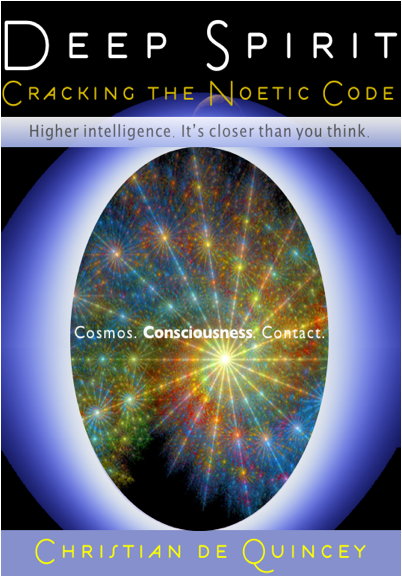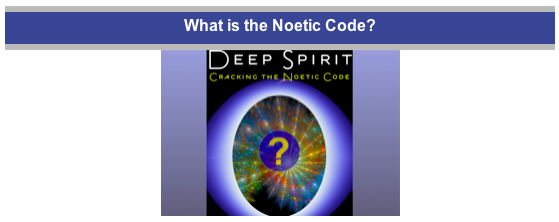Noetic Knowing

 Darwin opened the afternoon dialogue, with Maya and Dara seated by the edge of the pool. He addressed the NASA scientist:
Darwin opened the afternoon dialogue, with Maya and Dara seated by the edge of the pool. He addressed the NASA scientist:
“Our first task, Dr. Dara, is to undo years of scientific brainwashing. As long as you are dealing with the mechanics of the world, science has great value. But now it is time to deal with the noetics of the world. This is true not only for you, it is true for your culture as a whole.”
Dara admitted that the word “noetics” was new to him.
“Yes, I’m sure it has not been part of your scientific training. Nevertheless, many people in your culture have been open to the noetic way for centuries. I will teach you more about noetics as we get to know each other better. For now, think of it as a kind of super-intuition.” The dolphin smiled:
“It’s what I use to connect with you directly mind-to-mind. It’s what Maya’s people use to communicate with nature.” He brushed his dorsal fin against her legs dangling in the water.
“‘Noetic’ is an ancient Greek word. It refers to a kind of knowledge beyond the normal senses and reason. It is immediate, direct, and powerful—a ‘hot line’ to spiritual reality.”
“So ‘noetic’ is a way of knowing,” Dara offered, “above and beyond how we ordinarily know things?”
“Well, tell me how you ordinarily know things,” Darwin asked.
The NASA scientist thought for a moment: “People use different ways of knowing. Some say ‘seeing is believing’ — preferring to stake their knowledge on the evidence of the senses.” He slapped the surface of the water, as if to say, “There, if you can see it and touch it, it’s real.”
He continued: “However, the senses can be fooled—for instance, in optical illusions or hallucinations. So some people prefer to build up knowledge by thinking clearly and coherently according to the rules of logic. We call this kind of knowing ‘reason’.”
Maya chimed in: “Then, again, some people feel that both the senses and reason—even when used together—are very limited ways of knowing. The senses can reveal only shapes, colors, sounds, tastes, and so on; in other words, quantities and qualities of external, physical things. But so much of what we know belongs to our interior lives—for instance, our pleasures, our pains, our meanings, our values, and our loves. These cannot be grasped by the senses. And the best reason can do is give us abstract concepts about our interior lives—frozen snapshots taken from the flow of living experience itself.”
“That’s correct,” Darwin agreed, leisurely swimming back and forth just beneath the feet of the two scientists. His sleek body, gliding through the water, generated small waves that fanned out and encircled the three of them.
“Most of the knowledge derived from the senses and reason is about doing things. Philosophers call it ‘instrumental’ knowing. It is usually focused outwards, on manipulating the external world to suit your purposes. That’s not bad. It plays a great part in your day-to-day survival. Doing is important, no doubt about it. But knowledge about how to do things is only part of what you need to know in life.”
The dolphin came right up to Dara and pointed his snout at him.
“Unless your actions in the world are guided by a deeper—some might say wiser—mode of knowing, they will not serve or satisfy your deeper needs, the needs of your inner life. For that, you need a different way of knowing — noetic knowing.”
He checked to see if Dara was following him. Maya knew exactly what Darwin was saying, even if it was different in her own language.
“Unlike instrumental knowledge, noetic knowing is about being or becoming rather than doing,” Darwin continued. “It is directed inward at the unfolding of consciousness or experience itself. Noetic knowing dives right into the heart of reality by tapping into the universal web of connections.”
Darwin noticed a furrow in Dara’s brow. “You seem a little puzzled Stanford?”
“I’m trying to get a clear grasp of what this noetic way of knowing is,” he said. “I’m not sure how it works.”
“How it works?”
“Yes. My senses work if I open my eyes or listen with my ears—by picking up light or sound waves. And reason works by linking concepts and ideas together in coherent ways . . . ” He paused. “But noetic knowing? Where does it come from?”
“Ah. Good question. First, notice you are trying to understand noetic knowing with words and concepts. That will never do. You’ve got to feel it. Instead of trying to understand what I’m saying, pay attention to the flow of feelings in your body, and to the quality of lightness in your mind.”
Dara allowed himself to just be, to let his body open up like an antenna tuned into unseen currents and messages streaming through the air around him. For a moment, he stopped trying to figure things out, and entered into a state of “flow” familiar to him from running and playing sports. Darwin continued:
“We need to integrate all ways of knowing—sensory, rational, embodied, intuitive or noetic. To live successfully in the world, we need to unlock the code that gives voice to the silent ‘language’ of nature. That’s our task as seers and shamans. It is my job to teach it to you and Maya.”
He stopped, then told Dara he would say more about the noetic code at a later time.
“For now,” he continued, “just know that some of your greatest visionaries have understood parts of the code. I can name a handful: quantum physicist David Bohm, renegade philosopher Arthur Young, dream psychologist Carl Jung, Jesuit paleontologist Teilhard de Chardin, as well as William James, the first great psychologist—and far back in your history, a mystic called Plotinus, and before him the great philosopher Plato. In different ways, these people knew that to live masterfully in the material world you have to see beyond surface appearances, into the deep intelligence of nature. For that you need noetic vision. It’s the only way to enter the dream world.”
Darwin paused. “It’s also what you will need to help me escape so I can fulfill my mission.”
He called the scientist closer and whispered:
“I never try to shift someone’s mental furniture unless I have their permission. Are you willing?”
Dara agreed without hesitation.

